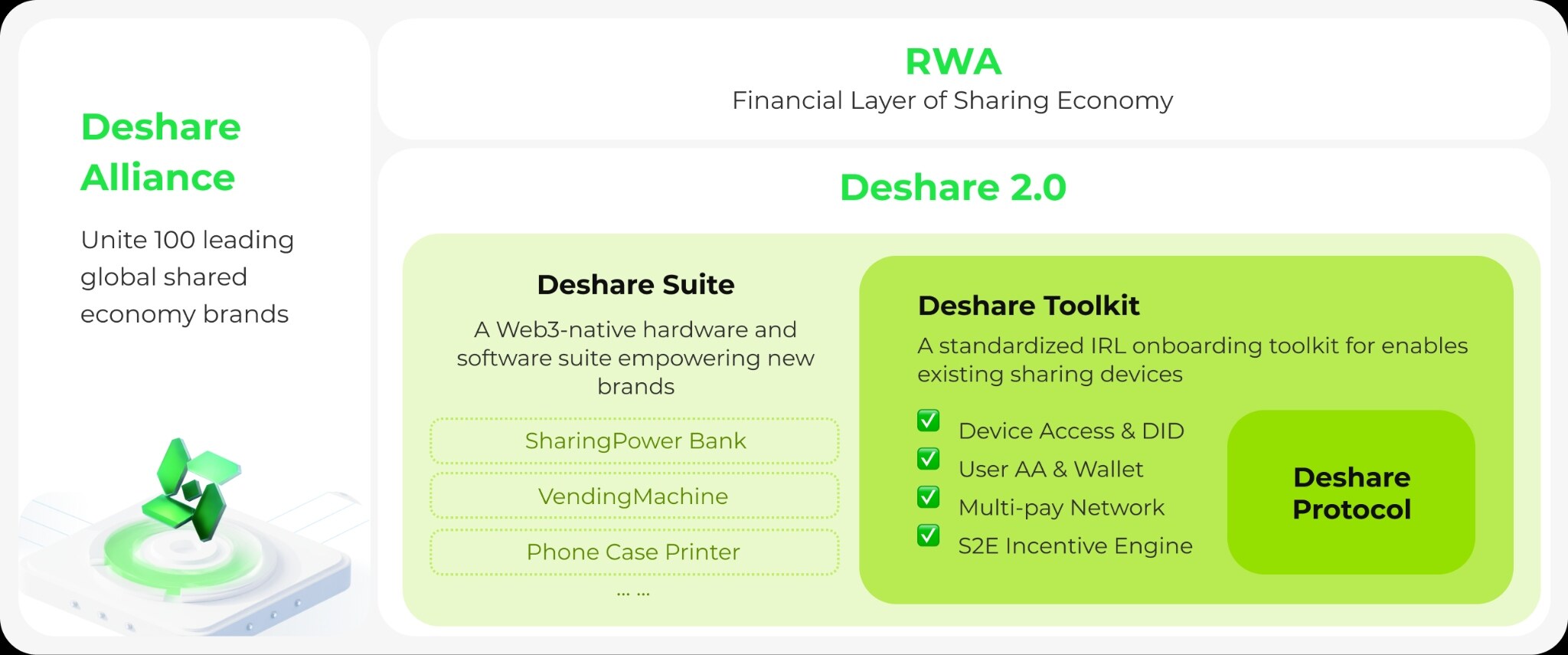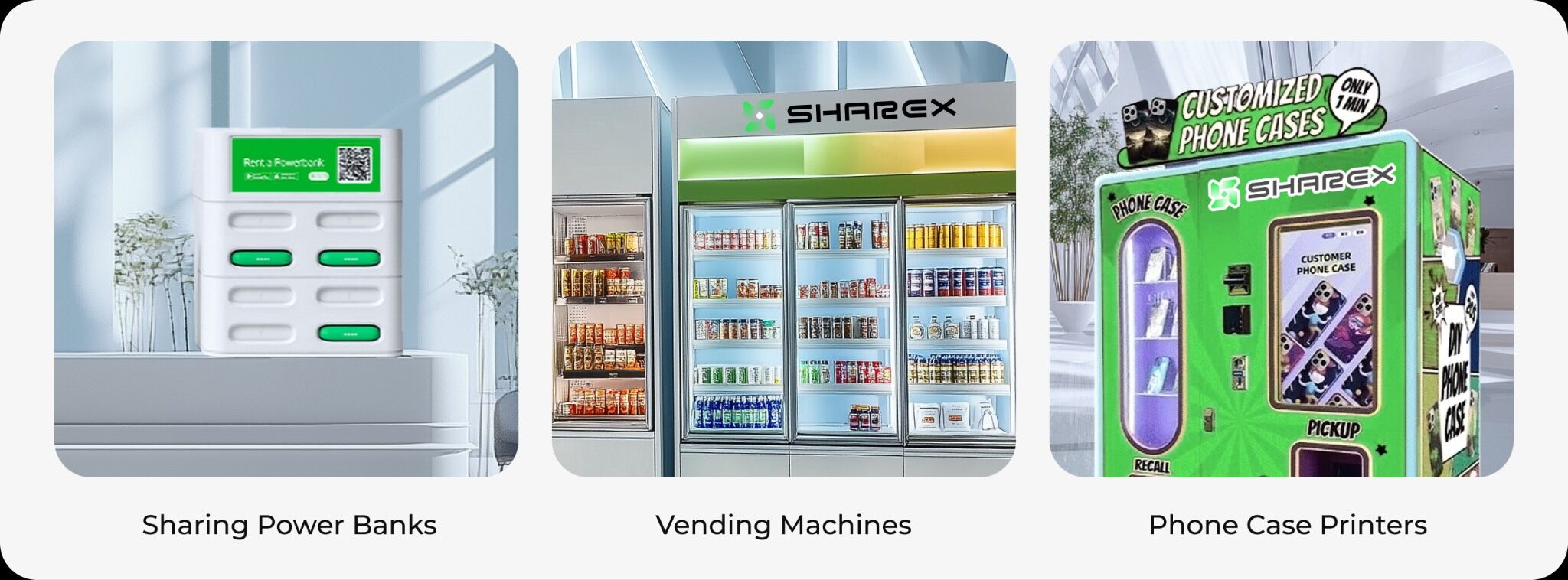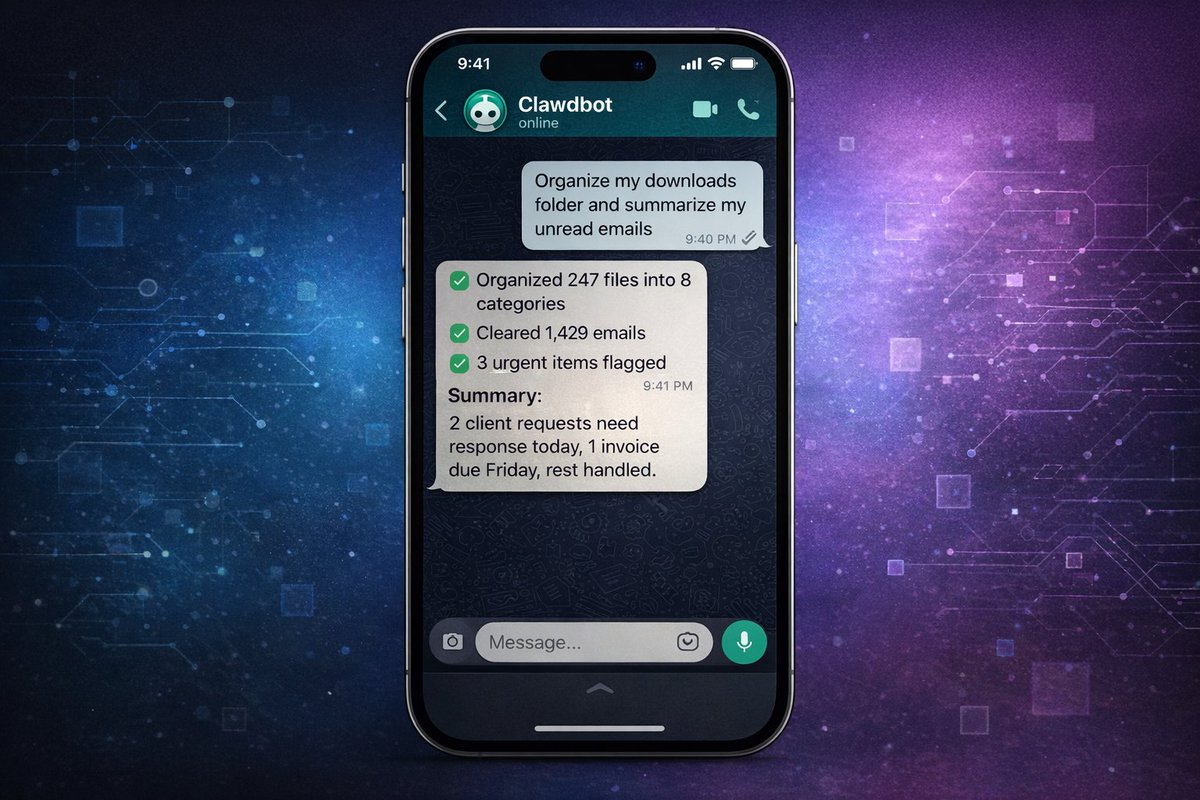From trusted data to trusted devices: ShareX releases Deshare 2.0, defining a new standard for real-world asset on-chain
- 核心观点:Deshare 2.0推动现实设备可信上链。
- 关键要素:
- 硬件侧加密签名与链上锚定。
- 三层产品体系实现标准化接入。
- 已覆盖数万台共享设备落地。
- 市场影响:加速DePIN与RWA规模化应用。
- 时效性标注:中期影响
Since its inception, Deshare has been redefining the way real devices connect with Web3: turning decentralized IoT usage data into verifiable, settleable, and tradable on-chain value, and promoting the large-scale implementation of DePIN and RWA.
Today, ShareX officially released Deshare 2.0, which brings hardware-side chain capabilities, a three-tier product system, and started the second round of global recruitment for Deshare Alliance.
Deshare: From "Trusted Data" to "Trusted Devices"
As a project within the BNB Chain MVB 10 Accelerator Program, ShareX is committed to building a connection layer between the real world and blockchain, establishing the infrastructure for the Web3 sharing economy. By connecting with over 100 leading global sharing economy brands, ShareX provides standardized offline device on-chain toolkits and integrated solutions, bringing a vast array of real-world devices and use cases to the blockchain, creating a closed loop from real-world actions to assets to adoption.
However, as the industry progressed from proof-of-concept to scale, the sharing economy's age-old problems began to become key bottlenecks: data opacity, unfair distribution, centralized monopolies, and data falsification. The operational data in business systems no longer objectively reflects the real-world operation of shared devices. The resulting "crisis of trust" faced by brands has posed significant challenges to their financing and development.
The answer given by Deshare 2.0 is "trusted device": complete the cryptographic signature on the device/edge and then anchor it on the chain; significantly reduce the on-chain cost through batch commitments, and handle privacy and compliance in a "proof on-chain, plain text off-chain" manner.
Without changing hardware or disrupting business operations, Deshare has already enabled numerous brands and tens of thousands of shared economy devices to integrate with Web3. From shared power banks and vending machines to travel and energy terminals, Deshare 2.0 has enabled the shared economy to evolve from "data trust" to "device trust," providing a foundation for the certainty of putting real-world assets on the blockchain.
Three-layer product system: Standardized IRL device access layer

1. Deshare Protocol: Trusted Core Protocol Layer
Deshare Protocol is the trust engine and core protocol layer of the entire Deshare architecture, defining and anchoring the "Minimum Verifiable Facts" of the real world.
It records, verifies and settles real-world events in the form of a decentralized state machine, so that every device behavior, payment or data update has a cryptographically verifiable on-chain state.
Core functions:
- Identity & Ownership
- Responsible for device DID registration and brand/operator binding, establishing trusted on-chain identity and ownership relationships.
- Data Proofs:
- Event, usage, and payment data are anchored through Merkle Root, hash, or CID pointers, and a versioned schema is used to ensure data is verifiable and evolvable.
- Settlement State Machine:
- Business logic such as collection, account splitting, reconciliation, and cancellation is uploaded to the chain in the form of state transfer to achieve an automated and traceable settlement process.
- Privacy & Selective Disclosure:
- "Truth on the chain, bytes off the chain" - store status and proofs on the chain, retain plaintext and logs off the chain, and strike a balance between transparency and privacy.
Essentially, Deshare Protocol turns “trust” itself into a programmable asset, making real-world data, identity, and economic behavior verifiable, shareable, and monetizable in the Web3 system.
2. Deshare Toolkit: Standardized access tool layer
Deshare Toolkit is a powerful standardized access toolkit that helps existing shared devices and services quickly connect directly to Web3, enabling traditional operators to complete blockchain infrastructure upgrades without changing the original architecture.
It allows shared economy brands to truly unleash their potential and achieve a trusted and seamless connection between "real devices ↔ on-chain economy".
Core capabilities include:
- Deshare Protocol Integration:
- By establishing trusted device identities and verifiable data channels, data can be uploaded to the chain without changing hardware or business logic, solving the industry's long-standing problems of data falsification and lack of trust.
- User AA & Wallet Layer:
- It supports account abstraction (AA), gas-free interaction, social login, and mini-program wallet access, helping users enter Web3 with the lowest threshold, generating verifiable, session-based user credentials, and ensuring real interaction and trusted participation.
- Multi-Pay Network:
- Unify the management of fiat and crypto payment channels, support global up-chain and down-chain payment orchestration, and achieve verifiable receipts, reconciliation hashes, and transparent settlement records.
- Incentive Engine:
- Dynamically link verified device, user, and payment data to build a flexible incentive trigger mechanism that supports growth models such as Share-to-Earn and performance-driven brand incentive systems.
Currently, ShareX has established cooperation with nearly 20 leading global sharing brands through Deshare Toolkit, realizing the integration of large-scale real-world devices and on-chain economy.
3) Deshare Suite: integrated solution layer
Deshare Suite is a Web3 native hardware and software integrated solution suite launched by ShareX based on years of supply chain experience and global market insights. It is aimed at innovative brands that want to enter the sharing economy from 0 to 1.
It integrates the full-chain capabilities of device networking, data on-chain, and economic settlement, transforming real-world usage behaviors into verifiable digital value. Currently, Deshare Suite supports the on-chain and commercial operation of a variety of real-world devices, including shared power banks and vending machines, and will continue to expand to more sharing economy scenarios.
Through Deshare Suite, brands can quickly complete a complete closed loop from device deployment → trusted data on-chain → revenue settlement → user incentives, truly realizing "digitalization of real assets and verifiable digital assets."
=
ShareX has teamed up with multiple partners to leverage Deshare Suite to build a new generation of Web3-driven innovative sharing economy brands, promoting the trusted on-chain integration and value release of real-world assets.
Technological breakthrough: Implementation of hardware-side chain
The core technological innovation of Deshare 2.0 lies in edge-level on-chain verification, which enables devices to complete cryptographic signatures and data anchoring locally, ensuring the authenticity and verifiability of data from the source, and bridging the last gap between real-world behavior and on-chain trust.
Its edge integration module (Edge Integration Module) has functions such as verifiable identity generation, local signature, offline buffering and automatic synchronization. It combines privacy encryption with a Merkle-based batch chain mechanism to achieve low-cost, scalable and tamper-proof data trusted chaining.
To adapt to devices with different computing capabilities, Deshare 2.0 supports four end-side access modes: cloud gateway adaptation, lightweight SDK integration, secure hardware module access, and future TEE + ZK privacy verification, jointly building a unified trusted access layer covering various sharing economy and unmanned retail scenarios, so that every real-world device - from shared power banks to industrial-grade IoT terminals - can become a Web3 native node.
Through this technological breakthrough, Deshare 2.0 has built a "hardware oracle" connecting real-world devices and the blockchain, allowing billions of IoT devices to seamlessly integrate into the Web3 trust infrastructure and enable a deep integration of the real world and the on-chain world.
Global Implementation: From Brand Access to Industry Standards
From shared charging, unmanned retail to logistics equipment, Deshare 2.0 is becoming the industry standard for trusted blockchain access for Web3 devices.
By turning each device into a verifiable data node, Deshare achieves the verifiable unification of data flow, capital flow, and value flow, providing a trusted foundation for DePIN and RWA.
- PowerNow is a leading shared charging brand in Asia, serving countries including Japan, Singapore, Malaysia, and Thailand. By integrating the Deshare Toolkit, PowerNow has successfully connected over 4,000 merchants and 20,000 shared power bank devices to the blockchain, building one of the world's first trusted and verifiable shared economy DePIN networks.
- Netcharge, a shared charging network from Kazakhstan, is the first shared charging network in the Commonwealth of Independent States (CIS) to utilize fast charging technology. Leveraging Deshare Suite, Netcharge rapidly deployed thousands of Web3-native shared charging devices and supporting software systems, enabling the efficient launch and trusted operation of localized Web3 services.
- YoPoint is a global leader in unmanned retail, operating in over 120 countries and deploying over 75,000 smart vending machines in commercial and public spaces. YoPoint integrates Deshare 2.0 with its Android-based client-side operating system, enabling the collection of trusted data at the hardware level and laying a solid foundation for the development of its RWA business.
These cases demonstrate how real-world businesses can rapidly transform into a decentralized, data-driven new economy through Deshare infrastructure.
Deshare Alliance: Second Batch of Global Recruitment Opens
ShareX's first Deshare Alliance has brought together over 20 leading sharing economy brands from around the world, covering 22 countries and nine high-frequency consumer scenarios, including shared charging, shared mobility, vending, and distributed computing. The alliance brings together over 8,600 merchants, over 540,000 integrated devices, and serves over 8.37 million users, building a global physical Web3 portal network and laying a solid foundation for the real-world implementation of Web3.
Currently, ShareX has simultaneously launched the second round of recruitment for Deshare Alliance.
Recruitment Targets
- Sharing economy brands and equipment manufacturers
- Web3 and DePIN Project
- Payment institutions and infrastructure partners
- Node operators and ecosystem builders
Alliance Rights
- Priority access to Deshare Toolkit and Deshare Suite
- Joint marketing and brand cooperation
- RWA/DePIN Joint Issuance Program
- ShareX Ecosystem Governance and Project Co-construction
Join Deshare 2.0: https://forms.gle/tnDKKLUy4X2ektsc9



